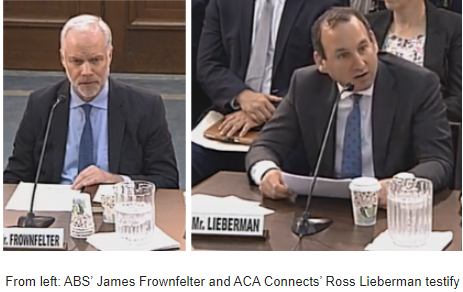Two weeks after the Senate grilled FCC Chairman Ajit Pai about financing an auction of C-band spectrum for wireless use, the House piled on Tuesday. Lawmakers on the House Energy and Commerce telecom subcommittee expressed their displeasure over a proposed private auction. Subcommittee Chairman Mike Doyle (D-PA) and several colleagues last week introduced the C-Band Act, which calls for the FCC to conduct a public auction of between 200 and 300 MHz of the C-band no later than September 30, 2022.
A group of satellite operators, the C-Band Alliance, asserts a private auction would be faster. Members revised their proposal to the FCC to free up more spectrum (see top story.) However House lawmakers Tuesday still leaned toward an FCC-run auction. Rep. Doris Matsui (D-CA), backs Doyle’s bill and said she’s, “concerned that the Commission may be pursuing alternatives to public auctions that could funnel proceeds to private parties rather than taxpayers and trigger time-consuming legal challenges.”
Eight Democrats on the panel, led by Reps. Tom O’Halleran (D-AZ) and Peter Welch (D-VT), also wrote to the FCC expressing their “strong preference for a public auction.”
Doyle said the money raised from the sale of C-band spectrum could be used to fund rural broadband, telehealth and other “critical needs. We will never have this opportunity again.” He said: “there’s no other source of revenue to do this.” His bill, Doyle said, ensures services are protected through the transition. “It addresses the needs of the country to close the digital divide.”
Rep. Frank Pallone (D-NJ), chairman of the full House Energy and Commerce Committee, said the C-band is under utilized but not unused; the CBA proposal of a private auction would be “unprecedented from the way we’ve instructed the FCC to conduct auctions in the past. We can’t afford to give away billions of dollars that could be used for public safety and broadband.”
Cable operators, led by ACA Connects – America’s Communications Association, have their own proposal to repurpose C-band that includes a fiber component and a public auction. ACA Connects SVP Ross Lieberman said the group represents small, rural cablecos. “Without a fiber alternative our members and their customers will be stuck with higher prices,” he said, referencing the need to install filters and reposition dishes for some 2,000 cable head ends. The CBA plan, “Would be all pain, and no gain. Our plan would clear 370 MHz of the band by migrating video traffic to fiber. Auction proceeds would cover the transition costs, including 120,000 fiber miles.”
Cisco Government Affairs and Technology Policy VP Jeff Campbell testified his company believes the band should be opened as quickly as possible. “We are not wedded to any particular mechanism. We do believe historically, government auctions” are slow and this process needs to be faster. “Cisco projects mobile traffic will rise five-fold by 2022. If you build it, they will come. This spectrum can be deployed through small cells to speed coverage,” Campbell testified.
James Frownfelter, Chairman and Chief Executive Officer of ABS, represented his company and two other small satellite operators, Hispasat and Claro. “Some have argued the spectrum should be simply taken from satellite companies. That would be a disaster for all of us and for wireless services,” said Frownfelter. “If the FCC confiscates our future spectrum rights,” that would be “disastrous for future investment.”
Doyle asked Frownfelter if, under the CBA proposal, smaller satcos “could potentially get no money” from a private auction. Frownfelter replied “yes.” Doyle pressed: “If that happens and the FCC hangs you out to dry, do you think your satcos would sue the FCC?” Frownfelter again said “yes.”
Frownfelter said his group has proposed what they believe to be a neutral way to proceed to an auction. “We are advocating a private sale with government oversight to make sure the process is transparent. The proceeds should be distributed across three [groups]: U.S. earth station operators and incentivize them to install latest compression equipment.”
A significant amount of proceeds (about 25 percent) should be mandated by FCC to go to the U.S. treasury under the small satco operators plan. And there should be a “fair distribution system to compensate licensees for capital and the potential loss of future revenue. This is fair and equitable,” Frownfelter testified. He added the concept is fast and has minimal potential for litigation.
Frownfelter added that the main difference between the small satco’s plan and the CBA proposal is: “theirs does not incentivize satellite companies,” which his group believes can speed the timeframe to clear the spectrum.
Cisco’s Campbell cautioned: “We believe speed to market is more important than the U.S. treasury impact because the economic impact of being late with 5G is larger.”
However, “if the problem of how to pay for rural broadband is not solved, in 20 years it won’t be a problem anymore, because people will leave,” said Rep. Bill Johnson (R-OH). The lack of broadband, “is hollowing out middle America.”
The C-Band Alliance and FCC Chairman Ajit Pai, who has said he plans to plot a course of action later this fall, were not asked to testify. The agency Tuesday released a tentative list of items to be voted on at its November 19 meeting; C-band was not on the list.
By Leslie Stimson, Inside Towers Washington Bureau Chief
October 30, 2019





Reader Interactions